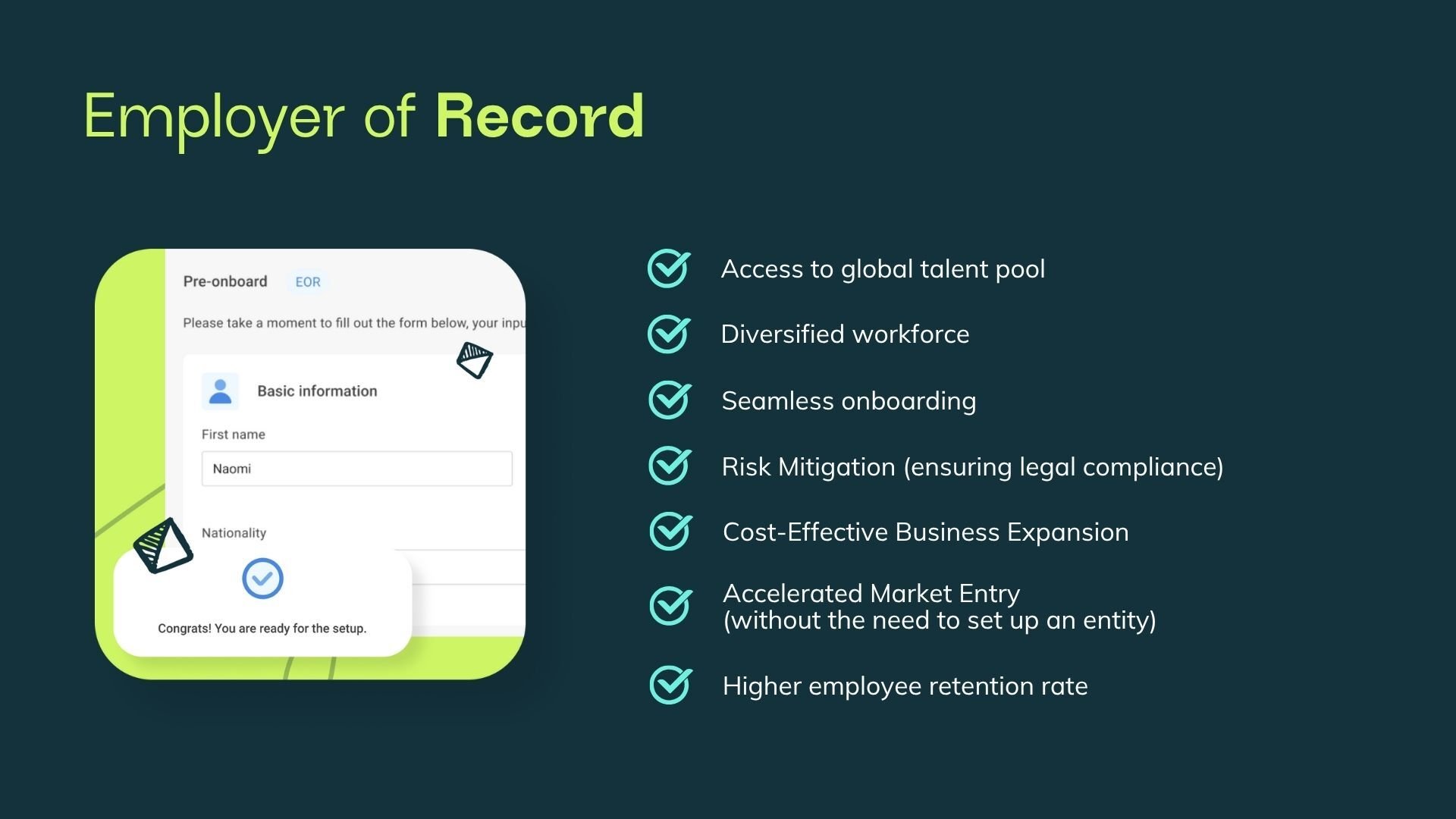|
Key Takeaways
|
- Employers can choose to either include the bank holidays within the 5.6 weeks (28 days) minimum statutory annual leave entitlement or offer them in addition to it, provided the approach is clearly stipulated in the employment contract.
|
- The official bank holiday schedule and number of holidays vary across the UK: England/Wales observe 8, Scotland 9, and Northern Ireland 10, each with unique regional dates (e.g., St Patrick's Day, 2nd January).
|
- Employees have no statutory right to time off or premium pay (e.g., time-and-a-half) for working on a bank holiday; their requirement to work and the compensation received is determined entirely by their employment contract.
|
- EOR solutions provide flexibility, faster hiring, and simplified payroll management for global companies.
|
- Businesses must comply with British labor laws, payroll regulations, and tax requirements when hiring employees.
|
1. Introduction
Navigating the UK bank holidays 2026 schedule is a critical task for any global employer. These holidays, officially known as "bank holidays," have a direct impact on payroll, leave management, and operational planning. With different schedules across England, Wales, Scotland, and Northern Ireland, staying compliant and keeping your business running smoothly requires careful preparation.
The UK Bank Holidays vs. Public Holidays: What's the Difference?

While the terms are often used interchangeably, understanding the distinction between bank holidays and general public holidays UK labor laws observe is essential.
- Public Holidays are common law holidays, established by convention or tradition. The most well-known examples are Christmas Day and Good Friday in England and Wales.
- Bank Holidays are officially designated days off by royal proclamation under the Banking and Financial Dealings Act 1971. The name originates from the fact that banks and most businesses would close on these days. If a bank holiday falls on a weekend, a "substitute" weekday, usually the following Monday, is designated as a bank holiday in lieu.
This guide provides the complete 2026 bank holiday calendar for each UK region and clarifies your obligations as an employer, ensuring your payroll and HR practices remain seamless and compliant.
2. The UK Official 2026 Public Holidays by Region
The number of bank holidays varies across the UK, with England and Wales observing 8, Scotland 9, and Northern Ireland 10. It's crucial for businesses with a diverse workforce to manage these regional differences.
- New Year's Day: Thursday, 1 January
- Good Friday: Friday, 3 April
- Easter Monday: Monday, 6 April
- Early May Bank Holiday: Monday, 4 May
- Spring Bank Holiday: Monday, 25 May
- Summer Bank Holiday: Monday, 31 August
- Christmas Day: Friday, 25 December
- Boxing Day (substitute day): Monday, 28 December
- New Year's Day: Thursday, 1 January
- 2nd January: Friday, 2 January
- Good Friday: Friday, 3 April
- Early May Bank Holiday: Monday, 4 May
- Spring Bank Holiday: Monday, 25 May
- Summer Bank Holiday: Monday, 3 August
- St Andrew's Day: Monday, 30 November
- Christmas Day: Friday, 25 December
- Boxing Day (substitute day): Monday, 28 December
- New Year's Day: Thursday, 1 January
- St Patrick's Day: Tuesday, 17 March
- Good Friday: Friday, 3 April
- Easter Monday: Monday, 6 April
- Early May Bank Holiday: Monday, 4 May
- Spring Bank Holiday: Monday, 25 May
- Battle of the Boyne (Orangemen's Day - substitute day): Monday, 13 July
- Summer Bank Holiday: Monday, 31 August
- Christmas Day: Friday, 25 December
- Boxing Day (substitute day): Monday, 28 December
UK Official 2026 Public Holidays: Key Dates to Note
- Substitute Days: In 2026, Boxing Day falls on a Saturday. Consequently, a substitute bank holiday is observed on Monday, 28th December across all regions. Northern Ireland also has a substitute day for the Battle of the Boyne.
- Regional Variations: Scotland has unique holidays, such as the 2nd of January and St. Andrew's Day, and its Summer Bank Holiday is in early August, unlike the rest of the UK. Northern Ireland celebrates St. Patrick's Day and the Battle of the Boyne.
3. Workforce Planning Around UK Public Holidays

Effective workforce management during bank holiday periods is essential for maintaining productivity and employee satisfaction.
- Leave Requests: Expect a surge in holiday bookings around the Easter, early May, and late August long weekends. Proactive planning for team coverage is vital to avoid operational gaps. For more information, please refer to UK Employment Guide
- Payroll Timing: Bank holidays can disrupt standard payroll schedules. If your payday falls on or near a public holiday, you may need to process salaries earlier to ensure employees are paid on time.
- Regional Team Management: For companies with employees across the UK, it is crucial to manage different holiday schedules. This requires flexible HR solutions and clear communication to handle varied leave requests and ensure equitable treatment.
- Part-Time & Shift Workers: Calculating holiday pay and entitlement for part-time staff can be complex. Employers must ensure part-time workers receive a pro-rata entitlement for bank holidays to avoid unfair treatment.
The British government underwent an immigration reform last May 2025, here’s a detailed guide for global employers on the UK Immigration Reform 2025 and the UK Employment Guide
Managing Remote Workers Across UK Regions
With the rise of remote work, a common confusion arises: If a company is based in London but the employee works remotely from Scotland, which bank holidays apply?
- The General Rule: Usually, the employee observes the bank holidays of the location where they physically work (e.g., Scotland), not where the HQ is located.
- Contract Clarity: To avoid disputes, employment contracts must explicitly state which jurisdiction’s holiday calendar applies. This is vital for accurate leave tracking, especially regarding the 2nd of January (Scotland only) or St Patrick's Day (Northern Ireland).
Want to hire local talent in the United Kingdom while staying fully compliant with local regulations? Click the link to explore our United Kingdom hiring guides, the United Kingdom employer NICs guide or schedule a free one on one consultation with us.
4. Employer Obligations Under UK Law

Understanding your legal responsibilities regarding bank holidays is non-negotiable. Mismanagement can lead to payroll errors, employee disputes, and legal challenges.
- Statutory Leave: Full-time employees in the UK are entitled to a minimum of 5.6 weeks (28 days) of paid annual leave. Employers can choose to include the 8 public holidays within this entitlement or offer them in addition.
- Working on a Bank Holiday: There is no automatic statutory right for an employee to have time off on a bank holiday. Whether an employee is required to work depends on their employment contract.
- Pay for Working on a Bank Holiday: Similarly, there is no statutory right to extra pay for working on a bank holiday. Compensation, such as enhanced pay (e.g., time-and-a-half) or time off in lieu, is determined by the terms of the employment contract.
- Substitute Holidays: When a bank holiday falls on a weekend, a substitute weekday must be applied consistently.
- Compliance Risk: The employment contract is the key document. It must clearly state the policy on bank holidays, including whether they are part of the annual leave entitlement and the rules for working on these days.
Common Employer Mistakes & Cost Considerations
-
Ignoring Regional Dates: Failing to adjust payroll for specific regional holidays (like Battle of the Boyne in Northern Ireland) is a frequent compliance gap.
-
Miscalculating Total Costs: When budgeting for holiday pay or overtime premiums, employers often overlook statutory costs. Remember to factor in employer NI rates (National Insurance) and pension contributions on top of any enhanced holiday pay. Accurately forecasting these costs is essential for preventing budget overruns.
-
Part-Time Pro-Rata Errors: Incorrectly calculating holiday entitlement for part-time staff often leads to tribunal claims. Always use the pro-rata formula to ensure fairness.
Setting up a UK Entity vs. Slasify EOR Solution
A US tech company needed to hire a developer in Belfast and a sales lead in London. Confused by the different holiday calendars (St Patrick's Day vs. standard English holidays), they used Slasify. We automated the holiday entitlement split, ensuring the Belfast employee got their specific regional days off, while the London employee followed the English calendar: all under one compliant payroll invoice.
|
Feature / Requirement
|
The UK Entity Setup
|
Slasify EOR Solution
|
|
Time to Market
|
Months (Requires setting up a corporate bank account and HMRC PAYE registration)
|
Days (Onboard your UK talent immediately through our existing infrastructure)
|
|
Compliance Risk & Liability
|
High (You are solely responsible for GDPR, pension auto-enrolment, and calculating accurate employer NI rates)
|
Zero (Slasify assumes full legal liability as the Employer of Record)
|
|
Holiday Pay Management
|
Manual (You must track regional differences across England, Scotland, and NI yourself)
|
Automated (Our system automatically applies the correct regional bank holidays and pro-rata rules)
|
|
Cost Structure
|
High & Unpredictable (Fixed costs for legal counsel, local accountants, and setup fees)
|
Transparent (A single, predictable monthly fee with no hidden administrative costs)
|
5. UK Payroll & Compliance Considerations

Accurate and timely payroll processing around bank holidays is a cornerstone of compliance.
- Payroll Schedule Planning: Review your payroll calendar and adjust processing dates to account for bank closures, ensuring funds are cleared and employees are paid on schedule.
- Holiday Premiums: If your contracts stipulate premium pay for working on bank holidays, your payroll system must be equipped to handle these variable rates accurately.
- Cross-Region Teams: A robust payroll solution is needed to harmonise different holiday calendars for teams in England, Scotland, and Northern Ireland, ensuring compliance with local schedules.
- Reporting & Audits: Maintain meticulous records of holiday pay, leave taken, and any substitute days provided. This is crucial for internal audits and demonstrating compliance with HMRC.
For companies with cross-regional teams (e.g., in England, Scotland, and Northern Ireland), an EOR provides a unified solution that handles different local holiday calendars, ensuring compliance across all locations.
2026 UK Bank Holiday: Payroll Cut-Off Planner
| Holiday Cluster |
2026 Dates |
Payroll Action & Consideration |
| Easter Weekend |
Apr 3 (Good Friday) –
Apr 6 (Easter Monday)
|
4-day bank closure. Process and authorize payroll by Wed, Apr 1 to ensure funds clear in employees' accounts on time. |
| Spring/Summer Bank Holidays |
May 4, May 25, Aug 31 |
Banks are closed on these Mondays. If payday falls on the 1st or end of the month, advance payroll cutoff to the preceding Thursday. |
| Christmas Period |
Dec 25 (Christmas) –
Dec 28 (Boxing Day observed)
|
Extended weekend closure. Process payroll early (e.g., Dec 18-20) to avoid delays and accommodate staff taking annual leave. |
6. How Slasify Supports Employers in the UK

Managing the complexities of UK public holidays, especially across different regions, can be a significant administrative burden. As an Employer of Record (EOR) provider, Slasify offers comprehensive HR and payroll solutions to ensure you remain compliant and efficient.
- Automated Holiday Pay Calculations: Our systems accurately compute holiday entitlements, premiums, and substitution day adjustments, eliminating the risk of manual error for full-time, part-time, and shift workers.
- Employer of Record (EOR) Capabilities: We enable you to hire UK-based employees without establishing a local legal entity. Slasify acts as the legal employer, ensuring full compliance with all UK employment laws, including complex holiday regulations.
- Flexible Payroll Solutions: Our platform seamlessly aligns payroll runs with bank holidays, tailored to regional calendars to guarantee timely and accurate salary payments for your entire UK team.
- Advisory & Compliance Support: Our UK-based experts provide guidance on navigating regional holiday variations, interpreting contractual obligations, and ensuring your business stays ahead of any legislative changes.
7. Conclusion
The 2026 UK bank holiday schedule presents a familiar yet complex challenge for employers due to its regional variations and the impact of substitute days on payroll and staffing. Proactive planning for leave management and payroll adjustments is not just good practice—it's essential for maintaining legal compliance, business continuity, and employee trust.
Why spend months wrestling with HMRC registrations when you can onboard your UK team by next week? Let Slasify handle the intricacies of UK payroll, Employer of Record (EOR), holiday pay, and compliance, so you can focus on what matters most: growing your business.
8. FAQ: 2026 UK Public Holidays & Employer Queries

Q1: Are UK bank holidays part of statutory annual leave?
Employers can choose to either include the bank holidays within an employee's statutory annual leave entitlement or provide them in addition to it. The legal minimum for full-time employees is 5.6 weeks of paid holiday per year. The employee's contract should specify which approach the employer uses.
Q2: What if a bank holiday falls on a weekend: how is it substituted?
If a bank holiday occurs on a Saturday or Sunday, a "substitute" weekday, typically the following Monday, is designated as the bank holiday in lieu.
For example, in 2026, since Boxing Day (December 26) falls on a Saturday, the substitute holiday will be observed on the following Monday (December 28). This ensures that employees who work Monday to Friday still get the benefit of the holiday.
Q3: Do part-timers get holiday pay?
Yes, part-time workers are entitled to a pro-rata equivalent of the statutory holiday entitlement. This means their total number of days or hours is adjusted to reflect their working pattern while still receiving the same number of weeks of paid holiday as a full-time employee.
Q4: Must employers offer extra pay for holiday work?
No, there is no legal requirement to provide extra pay for working on a public or bank holiday. Any compensation, such as enhanced pay, is determined by the terms of the employment contract.
Q5: How to manage regional differences in holiday calendars?
The UK has different holiday schedules for its four nations. England and Wales typically have 8 bank holidays, Scotland has 9 (often adding St Andrew's Day or Jan 2nd), and Northern Ireland has 10 (including St Patrick's Day and Battle of the Boyne). The most effective way to manage this is to clearly define holiday entitlements in each employee's contract based on their specific work location, ensuring compliance across borders.
Q6: What happens if payroll is delayed due to a holiday?
Payroll departments typically process payments early if a scheduled payday falls on a bank holiday or weekend. This is done to ensure employees receive their pay on or before the agreed-upon date. Delayed payment may lead to a monthly penalty.
Q7: Can employees refuse to work on a bank holiday?
A: It depends on the contract. If the employment contract states that bank holidays are normal working days (common in retail, hospitality, or essential services), employees generally cannot refuse to work unless they have valid grounds (e.g., religious reasons or illness). However, employers should handle such requests reasonably to maintain morale.
Q8: How do I calculate pro-rata bank holidays for part-time workers?
A: To avoid discrimination, part-time workers are entitled to a pro-rated allowance. For example, if a full-time worker gets 8 bank holidays, a part-time worker working 3 days a week would typically be entitled to: (3 ÷ 5) x 8 = 4.8 days. This is usually rounded up or added to their total annual leave allowance.
